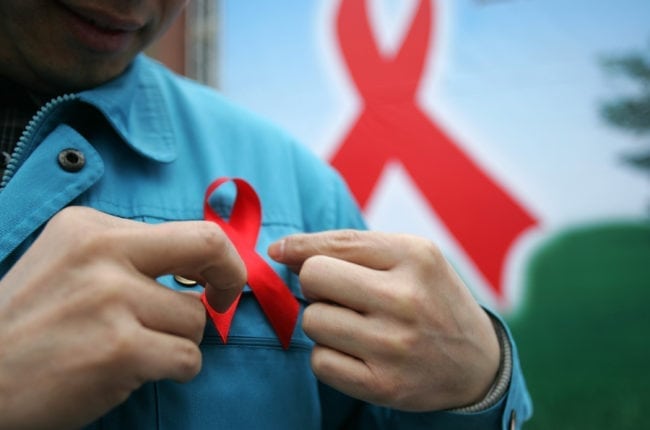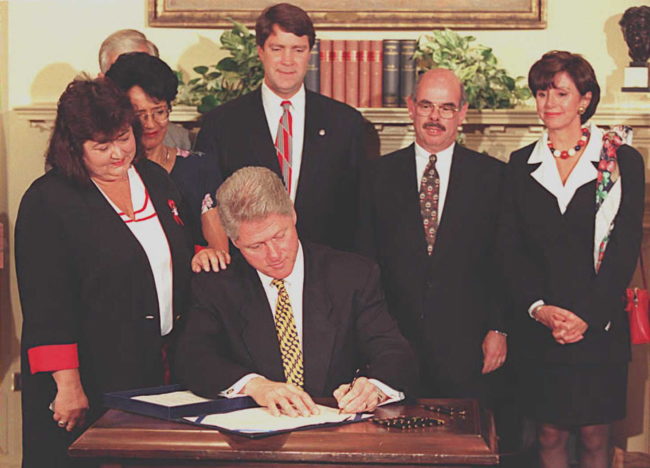Trump plans cuts to HIV research and support as infections in men under 30 rise

Donald and Melania Trump arrive at the 13th Annual Elton John Aids Foundation Academy Awards Viewing Party on February 27, 2005 in Los Angeles, California (Stephen Shugerman/Getty)
The Trump administration plans to use millions of dollars currently supporting healthcare research on cancer, HIV and other diseases to fund housing for a growing population of detained immigrant minors.
The Department of Health and Human Services (HSS) aims to channel $266 million of its current funding for a variety of programmes to finance the Unaccompanied Alien Children (UAC) programme, run by the HSS’ Office of Refugee Resettlement (ORR).
The plans are outlined in a letter dated September 5 signed by HHS Secretary Alex Azar to Senator Patty Murray of Washington State, the top Democrat on the Senate health committee. The letter was first obtained by Yahoo News and later published by CNN on Thursday.
News reports in recent months have suggested the HHS would reallocate funds from healthcare research to tackle the rising costs of providing for the immigrant children in custody, but the letter now provides a precise description of exactly which programmes would be affected, and by how much.
Azar intends to transfer $80 million from existing ORR programs for UAC use, and reallocate the remaining $186 million from programmes within the HHS—including a $5.7 million cut to the Ryan White HIV/AIDS programme, which provides funding to HIV health care and support services across the US.
It also earmarked a total $16.7 million from the Centers for Disease Control and Prevention (CDC), including $3.8 million dedicated to the prevention of HIV/AIDS, hepatitis, tuberculosis and sexually transmitted diseases, as well as $9.8 million from Medicare and Medicaid program operations and $13.3 million from the National Cancer Institute.
The publication of Azar’s plans comes as the CDC reported that 13-29-year-old men engaging in same-sex intercourse made up 45 percent of new HIV infections between 2008 and 2016.

A worker wears a red ribbon (China Photos/Getty)
The data highlighted racial and ethnic inequities in those diagnosed with HIV within the 13-29 age group. African Americans accounted for nearly half of the new diagnoses in that age group, and Latinos for a quarter of them.
“These findings highlight the need to strengthen interventions,” report author Andrew Mitsch wrote, “including risk-reduction counselling and screening, and provision of PrEP to [men who have sex with men (MSM)] at high risk for HIV acquisition.”
Mitsch also suggested that public health agencies and private sector partners have a role to play in improving health outcomes and reduce transmission and acquisition rates, “if prevention efforts are tailored to specific age groups,” and via “more widespread implementation of interventions for those with disproportionate risk and burden of HIV infection, such as black and Hispanic/Latino MSM.”
The HHS cuts seems to be somewhat proportional to the amount of funding allocated to the programmes at the beginning of the current fiscal year, which ends on September 30.
HHS Deputy Secretary Eric Hargan said the cuts are a “temporary” measure. “These transfers are only a temporary solution to the sad consequence of a broken immigration system,” he told CNN.
He did not mention that the reason why HHS is faced with a record-high number of 12,800 children under its care is likely due to Trump’s tighter immigration policies, which have delayed the speed at which unaccompanied migrant children are released to their relatives in the country, as CNN reported last week.

President Bill Clinton signs the Ryan White Comprehensive AIDS Resources Emergency Act Amendments of 1996 at the White House in Washington DC (Chuck Kennedy/AFP/Getty)
The HHS already transferred $17 million from the Ryan White HIV/AIDS program to the ORR earlier this year, as the department struggles with funding the mounting costs of care and reunification of migrant children—nearly 1,500 of whom the HHS is still unable to locate after they were released from custody over a three-month period this year, roughly 13 percent of the total 11,254 minors.
At the time, a HHS spokesperson told Politico the funds were “unused and unobligated” and did not affect the Ryan White HIV/AIDS programme’s work.
But Emily Holubowich, executive director of the Coalition for Health Funding, noted that any leftover funds should have been reinvested into fighting the disease.
“If there’s leftover money from Ryan White, it should go to support programmes for poor people with HIV and AIDS, not this outrageous separation policy,” she told Politico.

